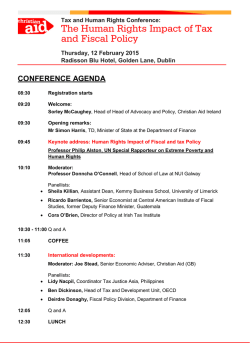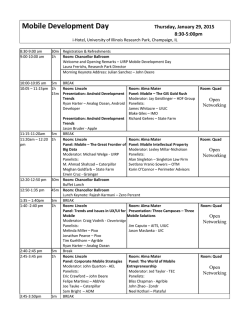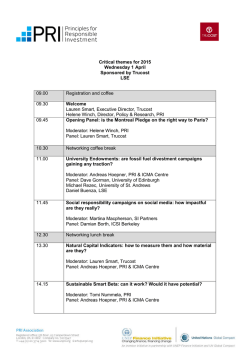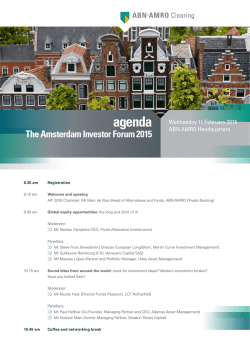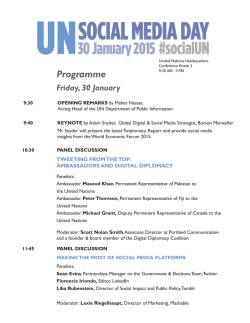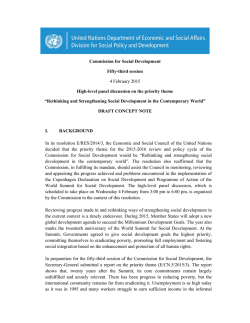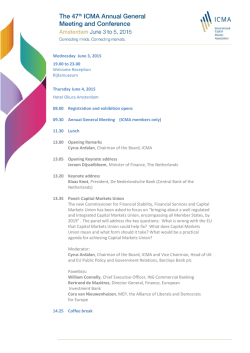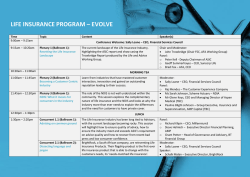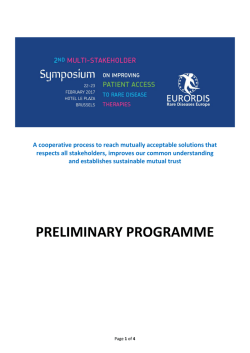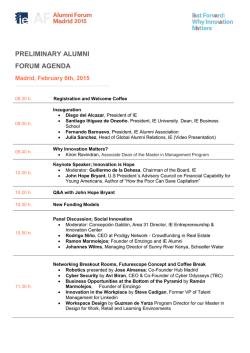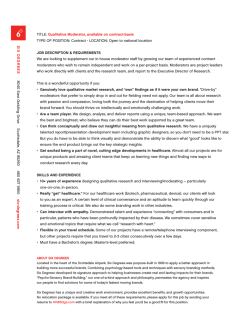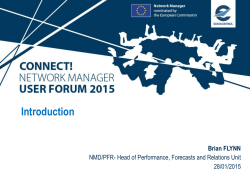
Concept Note
CommissionforSocialDevelopment Fifty‐thirdsession ConceptNoteandProgramme Paneldiscussiononemergingissues “ContributionsofSocialDevelopmenttotheTransitionfromMillennium DevelopmentGoalstoSustainableDevelopmentGoals” Friday,6February2015,10:00am–1:00pm ConferenceRoom4 1. Background PursuanttoEconomicandSocialCouncil(ECOSOC)decisionin2006,theCommissionfor Social Development has included the agenda item entitled ‘Emerging issues’ in its work programme since its 2007 ‐2008 review and policy cycle. Under this agenda item, the Commission addresses current issues affecting social development requiring urgent considerationor newcross‐cuttingissuesinthecontextof evolving globaldevelopment challenges.TheBureauoftheCommissiondecided“Contributionsofsocialdevelopment tothetransitionfromMillenniumDevelopmentGoalstoSustainableDevelopmentGoals” asthetopicofemergingissuesofthe53rdsession. The panel discussion will be informed by the Note by the Secretariat on the “Emerging issues: Contributions of social development to the transition from Millennium DevelopmentGoalstoSustainableDevelopmentGoals(E/CN.5/2015/6). SocialpolicycancontributetothetransitionfromtheMillenniumDevelopmentGoalsto the sustainable development goals in a number of areas across the three dimensions of sustainabledevelopment.Socialscienceandsocialpolicyprovideframeworkstoanalyse the negative impact of climate change and environmental degradation on vulnerable groups,communitiesandindividualsandprovidethemeanstobuildtheirresilienceand reducetheirvulnerability.Inaddition,itprovidesthemechanismstochangesocialnorms, valuesandbehavioursandtoempowerpeopleasactiveagentsofchangetowardsmore sustainablepathstodevelopment. 2. Objectives The main objective of the panel discussion is to discuss, drawing on the background note as well as insights of experts, how social development can contribute to achieve socially, economically and environmentally sustainable development. In specific, the panel aims to: 1) identify specific areas in which social policies and development have demonstrated to be effective and/or have a potential in promoting sustainable development in a more integrated manner; 2) discuss how social policies and development can help effectively addressing the inter-linkages between economic, environmental and social dimensions of sustainable development; and 3) build knowledge on innovative approaches and strategies, good practices and lessons learned at the national, regional and international levels in these areas, in order to support national efforts in transitioning from MDGs to SDGs. 3. Structureandformatofthepaneldiscussion Thepanelwillbecomprisedoffivepanellists.Eachpanellistwillmakea10‐15minutes presentation. The Chair of the Commission (Romania) will open the meeting with brief remarks and introducethemoderator,whowillconducttheinteractivepaneldiscussion. Themoderatorwillsetthestageandprovidesubstantiveunderpinningforthepanel. The moderator will introduce speakers (name, title and the profile), and invite them to speakinsequence. After each panelist’s presentation, the moderator will allow only “burning questions” directlyrelatedtothepresentation–2maximum.[Assuretheaudiencethattherewillbe sufficienttimeforinteractivedialogueafterthepresentations,andaskthemtoholdtheir questions) Interactive dialogue [The moderator could take 3–4 questions/ comments and invite paneliststorespond,andtakeanother3–4questions.Repeatiftimeallows.] Before closing the discussion, the moderator will give the panelists time for short concludingremarks. The moderator will wrap up the panel discussion, and give the floor back to the Chair, whowillclosethemeeting. 4. CompositionofthePanelandorderofpresentation Panellists 1. Mr.GabrielRiveraCondeyCastañeda,HeadofStrategicProjectsUnitofthe OfficeofthePresidencyandPresidentoftheSpecializedTechnicalCommitteeofthe InformationSystemoftheMillenniumDevelopmentGoalsofMexico 2. Mr.GeorgFischer,DirectorforAnalysis,Evaluation,ExternalRelationsinthe DirectorateGeneralforEmployment,SocialAffairsandInclusionattheEuropean Commission 3. Mrs.LauraMariaCraciunean,AssociateProfessoratLucianBlagaUniversityof Sibiu,SimionBarnutiuFacultyofLaw,Romania 4. Mr.RaymondTorres,Director,ResearchDepartment,InternationalLabour Organization(ILO) 5. Mr.ElliottC.Harris,DirectoroftheNewYorkOffice,UnitedNations EnvironmentProgramme(UNEP)andSecretaryoftheEnvironmentManagementGroup Moderator Ms.SarahCook,Director,UnitedNationsResearchInstituteforSocialDevelopment (UNRISD) 2 5. Guidingquestions TheCommissionforSocialDevelopmentmaywishtoconsiderthefollowingquestionsin itsdeliberationsontheemergingissueatitsfifty‐thirdsession: a) Howcansocialpolicy,povertyeradicationstrategiesinparticular,integrate environmentalsustainabilityperspectivesinthepromotionofinclusiveand equitableeconomicgrowth? b) Whatmeasurescanbetakentoimplementinnovativesocialprotectionsystems andprogrammesthatmitigaterisksarisingfromexternalshocksandnegative effectsofclimatechange,safeguardpeoplefromfallingintopovertyandenhance healthandeducationoutcomes? c) Thereareexistingandemergingjobopportunities,includinginsectorswhere upgradingofskillswillbeexpected,inthetransitiontoagreeneconomy.Howcan policymakersensureadequateinvestmentinhumancapacitytodevelop employableskillsintheseareas?Whatgoodpractices,bothintermsofnational programmesandinternationalsupport,canbeshared? d) Howcantheinternationalcommunityfacilitateknowledgesharingandaccessto newtechnologiesandinnovation,includingrenewableenergy,sustainableuseof naturalresourcesandecosystemservicesandinformationandcommunication technologies?Howcantheybemadewidelyavailabletoallmembersofsociety, includingyouth,olderpersons,personswithdisabilities,indigenouspeoples, othervulnerablegroupsandpeoplelivinginpovertyorinruralandremoteareas? 6. Timeallocation Speaker Chair:Openingremarks Suggestedspeakingtime 5 minutes Moderator:introduction/context‐setting 10minutes Panellists(5):Presentations 10– 15 minutesperpanellist Burningquestionsandanswers 10 minutes Moderated interactive discussion participationfromthefloor Panellists(5):Concludingremarks Concludingremarksbymoderator ClosingbytheChair with Approximately45 – 50 minutes Interventionslimitedtonomorethanthreeminutes each,followedbyresponsesfromthepanellists 2 ‐ 3 minutes wrap up for each person, as time allows 5 minutes Totalduration:3hours 3
© Copyright 2026
